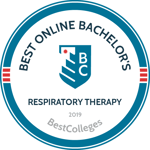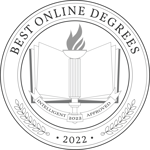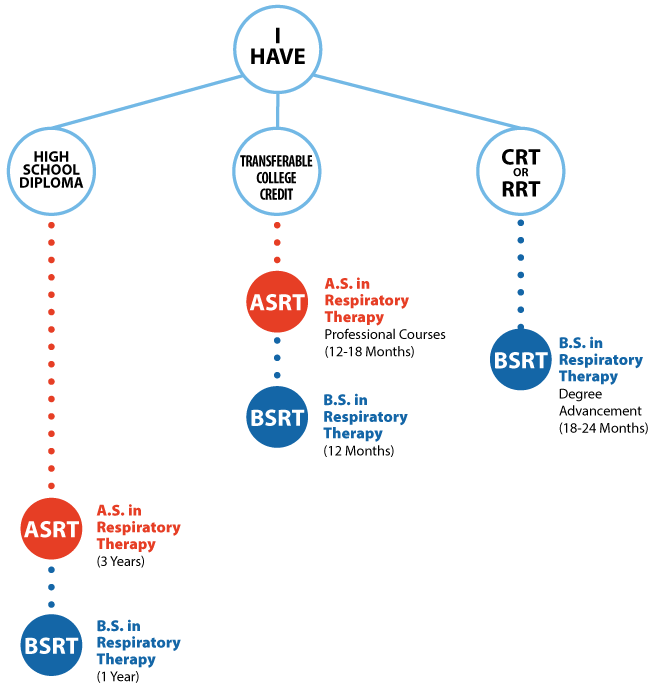To provide graduates of entry into respiratory care professional practice degree programs with additional knowledge, skills, and attributes in leadership, management, education, research, and/or advanced clinical practice that will enable them to meet their current professional goals and prepare them for practice as advanced degree respiratory therapists.
It is a requirement to complete the Registered Respiratory Therapist (RRT) credential by the end of the fourth year prior to graduation. A student cannot graduate without passing the national board exams leading to the RRT credential. This is a requirement for a degree advancement program set forth by CoARC accreditation.
BSRT Programmatic Student Outcomes Data
The Commission on Accreditation for Respiratory Care maintains the latest information on student outcomes from all accredited programs. https://coarc.com/students/programmatic-outcomes-data/
CoARC accredits respiratory therapy education programs in the United States. To achieve this end, it utilizes an ‘outcomes based’ process. Programmatic outcomes are performance indicators that reflect the extent to which the educational goals of the program are achieved and by which program effectiveness is documented.
Program Outcomes
Graduates of the BSRT program will:
1. Develop model, evidence-based protocols and respiratory care plans for clinical practice to include disease management.
2. Demonstrate the effectiveness of the respiratory therapist in health promotion and disease prevention.
3. Comprehend the role of leadership and management as it relates to healthcare policies that affect patient care and professional practice.
4. Utilize oral and written interdisciplinary communication in coordinating care for patients.
5. Apply educational theory practice to implement education programs for pulmonary disease patients.
AARC STATEMENT of ETHICS and PROFESSIONAL CONDUCT
In the conduct of professional activities, the Respiratory Therapist shall be bound by the following ethical and professional principles. Respiratory Therapists shall:
- Demonstrate behavior that reflects integrity, supports objectivity, and fosters trust in the profession and its professionals.
- Promote and practice evidence-based medicine.
- Seek continuing education opportunities to improve and maintain their professional competence and document their participation accurately.
- Perform only those procedures or functions in which they are individually competent, and which are within their scope of accepted and responsible practice.
- Respect and protect the legal and personal rights of patients, including the right to privacy, informed consent, and refusal of treatment.
- Divulge no protected information regarding any patient or family unless disclosure is required for the responsible performance of duty as authorized by the patient and/or family or required by law.
- Provide care without discrimination on any basis, with respect for the rights and dignity of all individuals.
- Promote disease prevention and wellness.
- Refuse to participate in illegal or unethical acts.
- Refuse to conceal, and will report, the illegal, unethical, fraudulent, or incompetent acts of others.
- Follow sound scientific procedures and ethical principles in research.
- Comply with state or federal laws which govern and relate to their practice.
- Avoid any form of conduct that is fraudulent or creates a conflict of interest and shall follow the principles of ethical business behavior.
- Promote health care delivery through improvement of the access, efficacy, and cost of patient care.
- Encourage and promote appropriate stewardship of resources.
- Work to achieve and maintain respectful, functional, beneficial, relationships, and communication with all health professionals.
Disregard for the effects of one’s actions on others, bullying, harassment, intimidation, manipulation, threats, or violence are always unacceptable behaviors. It is the position of the American Association for Respiratory Care that there is no place in a professional practice environment for lateral violence and bullying among respiratory therapists or between healthcare professionals.
Effective: 12/94
Revised: 10/21
For a more detailed description of the expectations for ethical behavior, see AARC's Position Statements.


.png)



